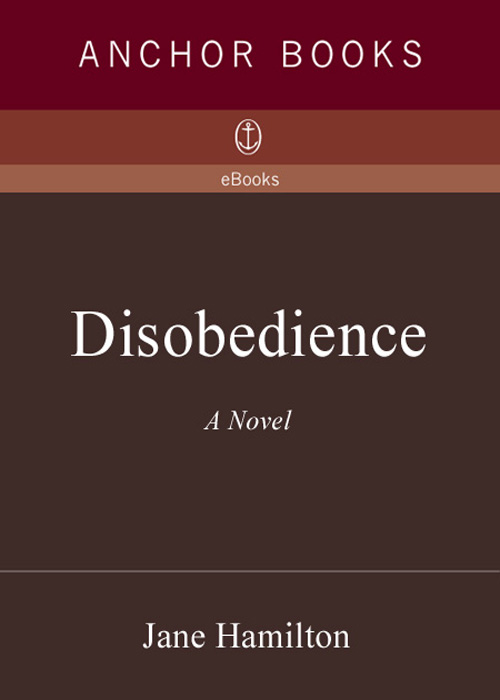
Disobedience
A Novel
کتاب های مرتبط
- اطلاعات
- نقد و بررسی
- دیدگاه کاربران
نقد و بررسی

October 2, 2000
Credit Hamilton with courage, virtuosity and a remarkable ability to reflect inner lives. Her first novel, The Book of Ruth, was the unsparing story of a girl trapped in woeful circumstances; the protagonist of her second, The Map of the World, was a woman responsible for a child's death; the narrator of The Short History of a Prince was a gay man. Here she again explores family bonds and tensions, the demands of sexuality and the ethics of betrayal (not an oxymoron)Dthis time from the point of view of a teenager who discovers that his mother is having an affair. Henry Shaw is a high school senior when he intercepts e-mail messages between his mother, Beth, a musician and specialist in ancient music, and violin maker Richard Pollico. As he secretly eavesdrops on the liaison between "Liza38" and "Rpol," Henry's emotions, ranging from horror to fear of abandonment to rage to deep sadness, take on a new dimension when he himself falls in love with a girl he meets in summer camp. Meanwhile, his generally bemused and patient father, Kevin, a high school history teacher, seems unaware of Beth's infidelity, since he spends much of his time coaching Henry's rebellious sister, Elvira, 13, who is obsessed with her desire to join a Civil War reenactment disguised as a boy. A mirror image of A Short History's protagonist, Walter, at the same age, Elvira displays an unhappiness with her gender that causes stress in the Shaw's marriage. As she has amply demonstrated before, Hamilton knows the nuances of domestic relationships and the landscape of teenage uncertainty. Henry's voice is exactly right: he's a thoughtful, intelligent boy whose hormones are sending him confusing messages, and whose tendency is to mock both parents with typical teen sardonic humor. Henry's funny quips are actually quite sad, because they mask his sorrow at the severing of his close bond with his mother, and his discomfort at secretly being aware of her illicit passion. Beth's joyous reaction to physical love and her anguish at how her behavior, if revealed, might affect her family, are likewise rendered with compassion. In a miracle of empathy, Hamilton manages to grant psychological validity to all the members of this ordinary-seeming but emotionally distracted family, and to strike the reader's heart with her tender evocation of both human fallibility and our ability to recover from heartbreaking choices. Author tour.

June 1, 2000
Even without a virus, e-mail can be dangerous. When 17-year-old Henry accidentally reads a message to his pianist mother, he discovers that she is having an adulterous affair with a romantic violinmaker.
Copyright 2000 Library Journal, LLC Used with permission.

August 1, 2000
Disobedience takes forms great and small in Hamilton's new family drama. The Shaws have just left Vermont for Chicago. Kevin is an affable and optimistic high-school teacher. Beth is an accomplished pianist. Henry, Hamilton's complicated narrator, is a mild-mannered and lonely high school senior. And Elvira, his tomboy little sister (and the novel's most charismatic character), is a hard-core Civil War reenactor who disguises herself as a boy while on the field and wishes she was one. Henry has inadvertently opened his mother's e-mail and discovered that she's having an affair with a violin player who lives in a log cabin just over the Wisconsin border. This knowledge frightens, angers, and intrigues him since he is in the throes of his first passionate relationship. As Henry ponders the mysteries of love, sex, marriage, and duty, Hamilton subtly questions the very notion of disobedience. Should one disobey the heart's desires to protect others? Is any one person in the wrong when relationships run aground? Hamilton's characters are magnetic, their predicaments are unexpected and wholly absorbing, and her finely crafted prose is vivid and suspenseful, yet this novel runs like a car with a shimmy, and the problem is Henry. He narrates with just the sort of sarcasm a bright and sensitive teenager would employ, yet he's writing from an unspecified future date and, therefore, interjects his older self's more knowledgeable perspective in such a way as to blur rather than sharpen his persona. But perhaps this glitch only serves to highlight the truth implicit in this wise and funny tale: we must "come of age" many times over the course of a life, and it never gets any easier. ((Reviewed August 2000))(Reprinted with permission of Booklist, copyright 2000, American Library Association.)

























دیدگاه کاربران